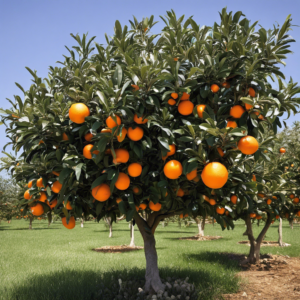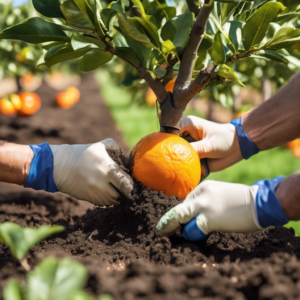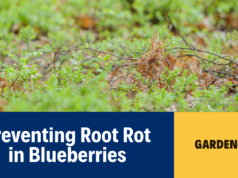
If you have an orange tree, then you know that it requires proper care to produce delicious and nutritious fruit. One of the most critical factors in orange tree care is selecting the right fertilizer. Choosing the wrong one can have a significant impact on the overall health and yield of your orange tree.
When selecting a fertilizer for your orange tree, it’s essential to consider its nutritional needs, the soil pH requirements, and environmental considerations. You want to choose a fertilizer that will provide the essential nutrients required for healthy orange tree growth and fruit production.
Key Takeaways
- Choosing the right fertilizer is crucial for successful orange tree care.
- Consider the nutritional needs, soil pH requirements, and environmental factors when selecting a fertilizer.
- Choose a fertilizer that provides the essential nutrients required for healthy orange tree growth and fruit production.
- Using organic fertilizers has many benefits, such as being environmentally friendly and having a natural composition.
- Proper techniques for applying fertilizer to orange trees include proper dosage, placement, and watering requirements.
Understanding Orange Tree Nutritional Needs
Orange trees require specific nutrients to support healthy growth and bountiful fruit production. To ensure your orange tree receives the necessary nutrients, it is important to understand its nutritional needs.
The primary nutrients required by orange trees are nitrogen (N), phosphorus (P), and potassium (K). Nitrogen supports leaf growth, while phosphorus is essential for root development and flower formation. Potassium aids in fruit development and enhances the overall health of the tree.
In addition to these primary nutrients, orange trees require secondary nutrients such as calcium (Ca), magnesium (Mg), and sulfur (S), as well as micronutrients like zinc (Zn), manganese (Mn), and iron (Fe).
Tip: A deficiency in any of these essential nutrients can result in stunted growth, reduced fruit production, and increased susceptibility to pests and diseases.
To fulfill orange tree nutritional needs, it is crucial to use appropriate fertilization techniques and carefully select a fertilizer that meets all its requirements. Stay tuned to the next sections to learn more about the factors to consider when selecting a fertilizer for orange trees, as well as the signs of nutrient deficiencies and their impact on overall tree health.
Factors to Consider When Selecting a Fertilizer for Orange Trees
Choosing the perfect fertilizer for your orange trees involves more than just picking a bag off the shelf. Several factors must be considered to ensure your trees receive the right nutrients at the correct time. These factors include:
Nutrient Composition
The nutrient composition of the fertilizer is a crucial aspect to consider when selecting a fertilizer for orange trees. Different fertilizers offer varying ratios of macronutrients such as nitrogen, phosphorus, and potassium. Ideally, a fertilizer with a balanced nutrient composition, such as 10-10-10, can benefit your orange trees by promoting healthy foliage and fruit production.
Soil pH Requirements
Orange trees require a soil pH level of 6.0 to 7.0 for optimal growth and nutrient absorption. Before choosing a fertilizer, it is vital to know your soil’s pH level to select a fertilizer that aligns with your soil’s needs.
Environmental Considerations
Environmental factors such as temperature, rainfall, and disease susceptibility can impact the performance of fertilizers on orange trees. Consider the climate in which your trees grow and the potential environmental risks to select a fertilizer that provides optimal growth throughout the year.
By taking into consideration the nutrient composition, soil pH requirements, and environmental considerations, you can choose the best fertilizer for your orange trees.
Signs of Nutrient Deficiencies in Orange Trees and Their Impact
Identifying nutrient deficiencies in orange trees is crucial for maintaining their health and productivity. Lack of nutrients can lead to stunted growth, poor fruit development, and increased susceptibility to pests and diseases. Here are some common signs of nutrient deficiencies in orange trees:
Iron Deficiency
Iron deficiency is common in orange trees, and it can cause yellowing of the leaves, especially in younger leaves. This condition, known as chlorosis, is characterized by green veins with yellow leaves, and it can impact tree growth and fruit production. To remedy the issue, applying an iron chelate fertilizer can help.
Nitrogen Deficiency
Nitrogen is essential for tree growth, and its deficiency can be identified through slow growth, pale leaves, and yellowing of older leaves. This condition can significantly impact the size and quality of fruits produced by the tree. Using a nitrogen-rich fertilizer at the right time can help address the issue.
Phosphorus Deficiency
Phosphorus is critical for healthy root development and fruit development. Its deficiency can impact early growth and result in weak and stunted trees. Symptoms of phosphorus deficiency can be identified through a dark green tint and a purple tint at the base of the leaves. To combat the issue, applying a high-phosphorus fertilizer can help.
Regular fertilization and timely treatment of nutrient deficiencies can help maintain optimal orange tree health. You can ensure healthy and productive orange trees by providing them with the appropriate nutrients through proper fertilization.
Organic Fertilizers for Orange Trees: Benefits and Recommendations
If you’re looking for a natural and environmentally friendly way to fertilize your orange trees, organic fertilizers are an excellent choice. Organic fertilizers are made from natural materials like compost, manure, bone meal, and fish emulsion, which provide a slow-release of nutrients that help your trees grow and produce fruit.
The biggest benefit of using organic fertilizers for your orange trees is that they are safe and chemical-free. You won’t have to worry about any harmful chemicals seeping into the soil or damaging surrounding plants or wildlife. Additionally, organic fertilizers can improve the overall health of your soil, which helps your trees grow stronger and produce higher quality fruit.
Some recommended organic fertilizers to consider for your orange trees include:
| Fertilizer | Nutrient Composition |
|---|---|
| Blood Meal | 12-2-1 |
| Bone Meal | 4-12-0 |
| Fish Emulsion | 5-1-1 |
| Compost Tea | Varies based on compost source |
When selecting an organic fertilizer, make sure to read the label carefully to ensure it contains the necessary nutrients for your orange trees. You should also consider factors such as the pH balance of your soil, the age of your trees, and the time of year. With the right organic fertilizer, your orange trees will thrive and produce a delicious harvest.
Synthetic Fertilizers for Orange Trees: Benefits and Drawbacks
While organic fertilizers have several benefits, synthetic fertilizers also have their advantages when it comes to orange tree care. Firstly, synthetic fertilizers are specifically formulated to provide a balanced nutrient composition, and the overall concentration of nutrients is higher than organic fertilizers, leading to quick and noticeable results. Synthetic fertilizers also have a longer shelf life, making them more cost-effective in the long run.
However, synthetic fertilizers have some drawbacks as well. They are chemical-based and can negatively impact the environment over time, with their remnants potentially causing water pollution. Overuse of synthetic fertilizers can also lead to a decrease in soil quality over time. Hence, it is important to use synthetic fertilizers in moderation and with caution.
Expert Tip: If you decide to use synthetic fertilizers for orange tree care, always read and follow the instructions carefully for the recommended dosage and application to avoid negative consequences.
Recommended Synthetic Fertilizers for Orange Trees and Their Nutrient Composition
Here are our top picks for synthetic fertilizers that would suit your orange trees and the relevant nutrient compositions:-
| Fertilizer Name | Nutrient Composition (%) |
|---|---|
| Scotts Turf Builder Lawn Food | 32-0-4 |
| Miracle-Gro All Purpose Plant Food | 24-8-16 |
| Jobe’s Organics Fruit & Citrus Fertilizer | 3-5-5 |
| Winchester Gardens Select Organics Berry Granular Fertilizer | 3-6-6 |
When choosing synthetic fertilizers for your orange tree care, it is important to consider the nutrient composition and the specific needs of your orange tree. By choosing the right fertilizer and applying it at the appropriate time and dosage, you can ensure robust growth and a plentiful harvest for your orange tree.
Application and Timing of Fertilizer for Orange Trees
Proper application of fertilizer is vital to achieving robust growth and a bountiful harvest for your orange trees. To ensure maximum efficacy of your fertilization efforts, it is crucial to follow some simple guidelines.
Guideline #1: Choose the Right Fertilizer
Before applying fertilizer to your orange trees, be sure to select the right type of fertilizer that aligns with the tree’s nutritional needs and soil pH requirements. Consider using organic fertilizers to avoid damaging the ecosystem, and choose synthetic fertilizers strategically for immediate result-driven outcomes.
| Fertilizer Type | Ideal Usage Scenario |
|---|---|
| Organic Fertilizer | Best for long-term soil fertility and health; avoids chemical harm to the environment; recommended for most trees |
| Synthetic Fertilizer | Best to improve immediate results and fast greenery; frequent use may damage the environment; ideal for correcting nutrient deficiencies in orange trees |
Note: Remember to read the package label and follow the instructions for recommended dosage, as over-applying fertilizer can harm your trees.
Guideline #2: Time Your Fertilizer Application with the Tree’s Growth Cycle
Like all trees, orange trees follow natural growth cycles. It is essential to fertilize your orange tree at the right time to ensure the plant receives the necessary nutrients needed for each stage of growth. Typically, oranges trees require fertilization during these key growth cycles:
- Early Spring- to stimulate new leaf and shoot growth
- Summer- to support fruit growth and development
- Fall- to build nutrient reserves for next year’s growth
Note: Avoid fertilizing your orange trees in winter or if the plant is dealing with stress, for this may damage the tree’s health further.
By following these guidelines, you can effectively apply fertilizer to your orange trees to support optimal growth and yield.
Recommended Organic Fertilizers for Orange Trees and Their Nutrient Composition
Choosing the right organic fertilizer is essential for maintaining healthy orange trees. Here are our top recommendations:
| Fertilizer Name | Nutrient Composition |
|---|---|
| Dr. Earth Citrus & Fruit Fertilizer | NPK ratio of 7-3-4, plus beneficial microbes and mycorrhizae |
| Jobe’s Organic Fruit & Citrus Fertilizer Spikes | NPK ratio of 3-5-5, plus bone meal, feather meal, and potash |
| Down to Earth Organic Citrus Fertilizer Mix | NPK ratio of 6-3-3, plus fish bone meal, kelp meal, and alfalfa meal |
| Fish Emulsion Fertilizer | NPK ratio of 5-1-1, plus trace minerals and micronutrients |
These organic fertilizers provide a balanced combination of essential nutrients such as nitrogen, phosphorous, and potassium, as well as secondary and micronutrients required for optimal orange tree health and fruit production. Their natural composition promotes healthy soil biology and reduces the risk of nutrient leaching, making them environmentally friendly choices.
When choosing an organic fertilizer, it’s crucial to consider the nutrient composition, as well as the specific nutritional needs of your orange tree variety. Applying these fertilizers as directed will help ensure your orange trees flourish.
Recommended Synthetic Fertilizers for Orange Trees and Their Nutrient Composition

If you decide to use synthetic fertilizers for your orange trees, it’s crucial to select the right product. Here are some recommended synthetic fertilizers and their nutrient compositions to help you make an informed decision:
| Fertilizer Name | Nutrient Composition |
|---|---|
| Miracle-Gro® Fruit & Citrus Tree Fertilizer Spikes | 12-6-12 |
| Jobe’s Organics Fruit & Citrus Fertilizer | 3-5-5 |
| Dr. Earth Natural Wonder® Fruit Tree Fertilizer | 7-4-2 |
| Bayer Advanced™ Fruit, Citrus & Vegetable Insect Control | 2-1-1 |
These synthetic fertilizers are recommended due to their high nutrient composition, ensuring your orange trees receive the essential nutrients they require for healthy growth and bountiful harvests.
Proper Techniques for Applying Fertilizer to Orange Trees

Ensuring that you apply fertilizer correctly is vital for promoting healthy growth and bountiful harvests. Follow these proper techniques for applying fertilizer to your orange trees:
Step 1: Determine the Right Dosage
Consult the recommended fertilizer dosage on the package, taking into account the age and size of your orange tree. Too much fertilizer can damage the roots, while too little will not provide the necessary nutrients for optimal growth.
Step 2: Select the Right Placement
Spread the fertilizer evenly around the base of the tree, keeping it a few inches away from the trunk to prevent burning. Consider using a broadcast spreader for large-scale orange tree fertilization and hand application for smaller trees.
Step 3: Water Correctly
Water deeply after fertilization to ensure the nutrients reach the root zone adequately. Avoid fertilizing your orange trees during dry spells, as they require consistent moisture levels to absorb nutrients optimally.
With proper fertilization techniques, you can enjoy robust growth and successful orange harvesting. Use a combination of the right timing, dosage, and placement to ensure that your orange trees get the nutrient-rich fertilizer they need for vibrant health and fruitful production.
FAQ
Q. Why is choosing the right fertilizer important for orange tree care?
A. Choosing the right fertilizer is crucial for orange tree care as it provides essential nutrients that promote healthy growth and maximize fruit production. Using the wrong fertilizer or neglecting to fertilize can result in nutrient deficiencies, reduced yield, and overall poor tree health.
Q. What factors should I consider when selecting a fertilizer for my orange trees?
A. When selecting a fertilizer for your orange trees, consider factors such as the nutrient composition, soil pH requirements, and environmental considerations. It’s important to choose a fertilizer that meets the specific nutritional needs of your orange tree variety and is suitable for your growing conditions.
Q. What are the signs of nutrient deficiencies in orange trees and how do they impact overall health?
A. Nutrient deficiencies in orange trees can manifest as yellowing or browning of leaves, stunted growth, poor fruit quality, and increased susceptibility to diseases and pests. These deficiencies can significantly impact the overall health and productivity of the tree, leading to reduced yield and compromised vitality.
Q. What are the benefits of using organic fertilizers for orange tree care?
A. Organic fertilizers offer several benefits for orange tree care. They are derived from natural sources, improve soil fertility, promote long-term soil health, and reduce the risk of chemical buildup. Organic fertilizers also enhance microbial activity, increase nutrient availability, and contribute to sustainable and environmentally friendly gardening practices.
Q. Which organic fertilizers are recommended for orange trees and what are their nutrient compositions?
A. Recommended organic fertilizers for orange trees include compost, well-rotted manure, bone meal, fish emulsion, and seaweed extract. Compost is rich in nitrogen, phosphorus, and potassium, while manure provides a balanced mix of these nutrients. Bone meal is a good source of phosphorus, and fish emulsion and seaweed extract offer a combination of trace minerals and plant growth stimulants.
Q. What are the benefits and drawbacks of using synthetic fertilizers for orange tree care?
A. Synthetic fertilizers provide immediate and concentrated nutrient delivery, which can lead to rapid growth and increased fruit production. However, synthetic fertilizers can be harsh on the environment, contribute to water pollution, and disrupt soil microbial activity. Overuse or improper application of synthetic fertilizers can also result in nutrient imbalances and long-term soil degradation.
Q. Which synthetic fertilizers are recommended for orange trees and what are their nutrient compositions?
A. Recommended synthetic fertilizers for orange trees include ammonium nitrate, potassium nitrate, and triple superphosphate. Ammonium nitrate and potassium nitrate provide nitrogen and potassium, while triple superphosphate is a significant source of phosphorus. These fertilizers offer a concentrated nutrient profile suitable for orange tree growth and development.
Q. What are the proper techniques for applying fertilizer to orange trees?
A. When applying fertilizer to orange trees, it’s important to follow proper techniques. Start by evenly spreading the fertilizer around the tree’s drip line, avoiding direct contact with the trunk. After application, lightly rake the fertilizer into the soil surface, then water thoroughly to ensure proper nutrient absorption. Avoid over-applying or applying near harvest time.
Q. When is the optimal timing for fertilizing orange trees?
A. Orange trees benefit from regular fertilization throughout the year. Apply a balanced fertilizer in early spring, just before the tree starts its active growth phase. Follow up with additional applications in late spring, early summer, and late summer, tapering off in the fall to allow the tree to prepare for dormancy.
Conclusion
Congratulations on completing this guide to selecting the right fertilizer for your orange trees! Taking care of your orange trees is crucial to ensure their robust growth and bountiful harvests. By understanding your orange tree’s nutritional needs, considering factors when choosing a fertilizer, and recognizing signs of nutrient deficiencies, you can maintain the overall health and productivity of your orange trees.
Organic or synthetic fertilizers can benefit your orange trees, depending on your preferences and the specific needs of your trees. With our recommended list of fertilizers and their nutrient compositions, you can make an informed decision to choose the most suitable fertilizer for your orange trees.
Remember to follow proper techniques for applying fertilizer to your orange trees, taking into account the optimal timing and dosage for fertilization. With consistent care and attention, your orange trees can thrive and provide you with delicious, juicy fruits to enjoy.
Thank you for choosing our guide, and we hope it has been informative and helpful in your orange tree care journey. Happy fertilizing!
















